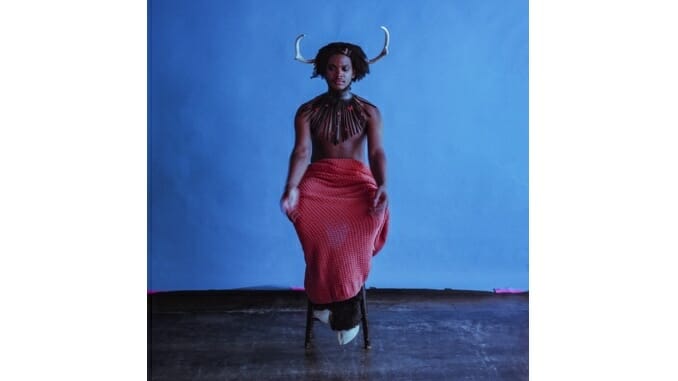Nearly seven years ago, I saw Shamir play “On the Regular” and other songs off his hit dance-pop record Ratchet at a pit-like stage at Ireland’s Electric Picnic festival, not just once, but twice—first in the evening and then in the wee hours of the morning. The memory is admittedly hazy, other than the overall sense of euphoria as I danced alongside my friends.
But while the Philly-based singer’s ever-catchy tunes brought us so much joy, the media attention Shamir received in response to Ratchet made him feel like “the teat of a cow … like I’d been wrung out for my sweet nectar and the people in charge will do what they want with it,” as he told NPR. The outsized focus on his identity and sexuality in interviews left Shamir feeling exploited and traumatized.
On his eighth studio album Heterosexuality, the Vegas-raised artist explores his queerness on his own terms and in a world that’s far more accepting, but also assured NPR that “there’s really no mission statement in this [record].” The songs all have meaning, of course, but the ways in which they resonate with different listeners helps Shamir “feel less alone.” Heterosexuality can be an overwhelming listen, packed with emotion and production choices that leave you gasping for air , but it’s also deeply rewarding.
Album opener “Gay Agenda” is an industrial banger, like some club-ready Sinead O’Connor. “You’re just stuck in the box that was made for me / And you’re mad I got out and I’m living free / Free your mind, come outside / Pledge allegiance to the gay agenda,” Shamir sings, the last two words soaring ever higher. The track flies in the face of the idea of the “good queer,” willing to make sacrifices for a veneer of acceptability in a heteronormative society, and relishes the idea of the “gay agenda,” that phrase that strikes fear into the hearts of conservatives everywhere. Shamir doesn’t give a fuck about those backwards ass religious nutjobs who claim to care for his soul: “Pray as much as you can, there’s no hope for me / I will see you in hell, I will be bringing the heat.”
“Cisgender” proves one of the most powerful songs on the record, focusing on Shamir’s rejection of any labels. “I’m not cisgender, I’m not binary, trans / I don’t wanna be a girl, I don’t wanna be a man / I’m just existing on this godforsaken land / And you can take it or leave it, or you can just stay back,” he wails, his voice otherworldly over thumping drum machine and silvery synth. So much of our identity formation involves slapping labels on ourselves, partly as a way of belonging. By categorizing ourselves, we feel we automatically fit in with a community of others who share certain traits. Shamir’s refusal to conform, though, challenges us to find connection with each other regardless of identity. “I’m not gonna pass for you / You gotta get past,” he sings, reminding us that the onus is on ourselves to open our minds and hearts to others, rather than for anyone to adhere to our definition of who they’re meant to be in order to find acceptance.
The bold production choices throughout the album reflect Shamir’s sloughing off of labels by avoiding association with any particular genre. The artist enlisted Hollow Comet, aka Isaac Eiger from Strange Ranger, as producer for the album, and in a press release, Shamir said Eiger’s sound was “something that honestly I was dreaming up in my head.” Much of the album is ‘90s-inspired—Nine Inch Nails, Bif Naked and Bjork are just a few listed influences—but the intoxicating confluence of squealing guitars, starry synths and fuzzed-out effects makes for a singular aural experience. Hollow Comet’s production has the same more-is-more sensibilities as that of the best hyper-pop artists, but with Shamir’s guitar-forward sound at its core. And the variety doesn’t stop there: Album closer “Nuclear” verges on lounge territory, while the acoustic beginning of “Father” gives way to an expansive synth breakdown halfway through. Shamir and Hollow Comet make for an awe-inspiring pairing.
Shamir’s song title choices possess layers that compound the album’s emotional impact. “Cold Brew” at first seems like a winking nod to queers’ meme-ified love of the icy beverage, but in the song itself, Shamir notes how he uses “cold brew and ginger beer to get rid of these nightmares,” reflecting on past trauma. “Marriage” and “Reproductive” both flip the typical script associated with these words. On “Marriage,” which features a zany guitar solo, Shamir shows how he’s whole on his own, married to himself: “I even have a ring, 24 karat misery.” And “Reproductive” isn’t about having kids, instead highlighting the toxicity of the systems in which we’ve grown up, and the desire not to reproduce structures that have caused so much harm: “I’ll make sure the evil ends here with me / If it’s the only thing I do.”
Regardless of your identity or Shamir’s, Heterosexuality bursts with meaning. Behind every unforgettable hook is a new way to look at ourselves and our world.
Clare Martin is a cemetery enthusiast, hibernophile and contributing writer for Paste’s music and comedy sections. She also exercises her love for reality TV at HelloGiggles every now and then. Go harass her on Twitter @theclaremartin.
